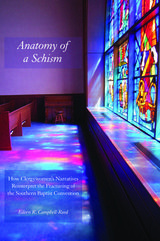
From 1979 to 2000, the Southern Baptist Convention (SBC) was mired in conflict, with the biblicist and autonomist parties fighting openly for control. This highly polarizing struggle ended in a schism that created major changes within the SBC and also resulted in the formation of several new Baptist groups. Discussions of the schism, academic and otherwise, generally ignore the church’s clergywomen for the roles they played and the contributions they made to the fracturing of the largest Protestant group in the United States. Ordained women are typically treated as a contentious issue between the parties. Only recently are scholars beginning to take seriously these women’s contributions and interpretations as active participants in the struggle.
Anatomy of a Schism is the first book on the Southern Baptist split to place ordained women’s narratives at the center of interpretation. Author Eileen Campbell-Reed brings her unique perspective as a pastoral theologian in conducting qualitative interviews with five Baptist clergywomen and allowing their narratives to focus attention on both psychological and theological issues of the split. The stories she uncovers offer a compelling new structure for understanding the path of Southern Baptists at the close of the twentieth century. The narratives of Anna, Martha, Joanna, Rebecca, and Chloe reframe the story of Southern Baptists and reinterpret the rupture and realignment in broad and significant ways. Together they offer an understanding of the schism from three interdisciplinary perspectives—gendered, psychological, and theological—not previously available together. In conversation with other historical events and documents, the women’s narratives collaborate to provide specific perspectives with universal implications for understanding changes in Baptist life over the last four decades.
The schism’s outcomes held profound consequences for Baptist individuals and communities. Anatomy of Schism is an illuminating ethnographic and qualitative study sure to be indispensable to scholars of theology, history, and women’s studies alike.
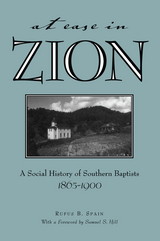
First published in 1967, Rufus Spain’s thorough investigation into Southern Baptist attitudes set the stage for research on religion in the American South. In At Ease in Zion, Spain questions the titular “ease” with society that Southern Baptists seemed to maintain following the Civil War. His analysis of denominational newspapers, as well as reports from the Southern Baptist Convention and state conventions, paint a compelling picture of the subjects’ complacency with their social existence, even as they criticized personal and recreational ethics.
While the South faced significant social, economic, and political changes after the Civil War, religion remained the primary moral influence. As the Southern Baptist denomination made up a significant majority of the population at that time, its leaders and attitudes had a clear and undeniable impact on social norms. Rufus Spain was one of the first writers to actively demonstrate the relationship between Southern religion and Southern society, and his work displays meticulous attention to the ways in which we are affected by complacency. He asserts that Southern Baptists viewed the American South as a version of God’s ideal society; any issues they wished to address were caused by individuals (such as those who did not conform to societal norms) or external attitudes (such as those in differing religions or regions).
At Ease in Zion is a critical part of the scholarly discussion on religion in society. Spain’s research offers a bold analysis of the American South and its citizens during one of the most tumultuous times in its history while providing a basis for arguments on “social Christianity” and its ever-shifting role in the world.

Since 1979 Southern Baptists have been noisily struggling to agree on symbols, beliefs, and practices as they attempt to make sense of their changing social world. Nancy Ammerman has carefully documented their struggle. She tells the story of the Baptist reversal from a moderate to a fundamentalist outlook and speculates on the future of the denomination.
Ammerman places change among the Southern Baptists in the context of the cultural and economic changes that have transformed the South from its rural past into an urbanizing, culturally diverse region. Not only did the South change; Southern Baptists did as well. Reflecting this diversity, the Southern Baptist bureaucracy was relatively progressive. During the 1960s and 1970s, moderate sentiments prevailed, while fundamentalists remained on the margins. These two were, however, becoming increasingly divergent in what they considered important about being a Baptist, in their views about the Bible, in their attitudes on the origination of women, on Christian morals, and on national politics.
Late in the 1970s, a fundamentalist coalition emerged, followed by unsuccessful efforts by moderates to oppose it. The battles escalated until 1985, when 45,000 Baptists gathered in Dallas to decide between contending presidential candidates. That dramatic event illustrated the extent to which organized political resources were determining the course of the conflict. Ammerman studies these strategies and resources as well.
Examining how this tension affected Baptists, Ammerman begins with case studies of the change it is producing in Baptist agencies. But she also brings us back to the local churches and individual believers who are renegotiating their relationships within their denomination. She asks whether the denomination’s polity can accommodate an increasingly diverse group of Baptists, of whether the only way dissidents can have a voice is through schism.
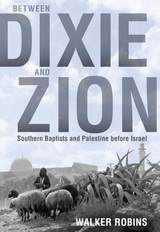
One week after the establishment of the State of Israel in 1948, delegates to the Southern Baptist Convention (SBC) repeatedly and overwhelmingly voted down resolutions congratulating fellow Southern Baptist Harry Truman on his role in Israel’s creation. From today’s perspective, this seems like a shocking result. After all, Christians—particularly the white evangelical Protestants who populate the SBC—are now the largest pro-Israel constituency in the United States. How could conservative evangelicals have been so hesitant in celebrating Israel’s birth in 1948? How did they then come to be so supportive?
Between Dixie and Zion: Southern Baptists and Palestine before Israel addresses these issues by exploring how Southern Baptists engaged what was called the “Palestine question”: whether Jews or Arabs would, or should, control the Holy Land after World War I. Walker Robins argues that, in the decades leading up to the creation of Israel, most Southern Baptists did not directly engage the Palestine question politically. Rather, they engaged it indirectly through a variety of encounters with the land, the peoples, and the politics of Palestine. Among the instrumental figures featured by Robins are tourists, foreign missionaries, Arab pastors, converts from Judaism, biblical interpreters, fundamentalist rebels, editorialists, and, of course, even a president. While all revered Palestine as the Holy Land, each approached and encountered the region according to their own priorities.
Nevertheless, Robins shows that Baptists consistently looked at the region through an Orientalist framework, broadly associating the Zionist movement with Western civilization, modernity, and progress over and against the Arabs, whom they viewed as uncivilized, premodern, and backward. He argues that such impressions were not idle—they suggested that the Zionists were bringing to fruition Baptists’ long-expressed hopes that Israel would regain the prosperity it had held in the biblical era, the Holy Land would one day be revived, and biblical prophecies preceding the return of Christ would be fulfilled.
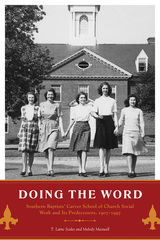
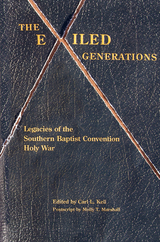
Until now, the stories of this “lost generation” have never been fully told. In this collection, Professor Kell presents a diverse and wide range of voices. Some are well-known Baptist leaders, while others are ordinary people caught up in the remarkable changes in Baptist life over the past few decades. Here, they recount their feelings of loss as they were severed from youth fellowships and removed from church rolls. Many describe the lingering emotional effects of the heartbreaking conflict that dominated their childhood and adolescence. Their recollections reveal the full range of responses—anger, sadness, pathos, humor, intense inner reflection—to these enormous shifts. This volume shows the extent to which this group has struggled and wandered in emotional and religious exile.
The Exiled Generations comprises rich primary sources for scholars and students who are exploring the profound strife that has rocked the Southern Baptist Convention. These deeply moving accounts will offer invaluable assistance to researchers analyzing the impact of the seismic changes within the denomination over the past thirty-five years.
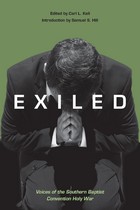
tactics to gain top positions and then used their power to purge Baptist seminary presidents and professors, church pastors, lay leaders, and women from positions of responsibility. America's largest Christian, non-Catholic denomination is firmly locked in a “holy war” to secure its churches and membership for a never-ending struggle against a liberal culture.
Exiled: Voices of the Southern Baptist Convention Holy War is a compilation of first-person narratives by conservative and moderate ministers and lay leaders who were stripped of their positions and essentially became pariahs in the churches to which they had devoted their lives.
While other books have described the takeover in historical, political, and theological terms, Exiled is different. Individual people tell their personal stories, revealing the struggle and heartache that resulted from being vilified, dispossessed, and exiled. Kell includes a variety of perspectives-from lay preachers and church members to prominent former SBC leaders such as James Dunn and Carolyn Crumpler.
The emotion captured on the pages-sadness, shock, disbelief, resignation,
and anger-will make Exiled moving even to readers who know little about the Southern Baptist movement. Exiled will also be of particular interest to historians, sociologists, philosophers of religion, and rhetorical historians.
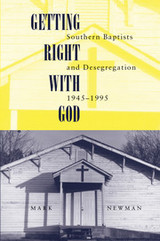
This groundbreaking study finds Southern Baptists more diverse in their attitudes toward segregation than previously assumed
Focusing on the eleven states of the old Confederacy, Getting Right with God examines the evolution of Southern Baptists’ attitudes toward African Americans during a tumultuous period of change in the United States. Mark Newman not only offers an in-depth analysis of Baptist institutions from the Southern Baptist Convention (SBC) and state conventions to colleges and churches but also probes beyond these by examining the response of pastors and lay people to changing race relations.The SBC long held that legal segregation was in line with biblical teachings, but after the Supreme Court's 1954 Brown vs. Board of Education decision in favor of desegregating public institutions, some Southern Baptists found an inconsistency in their basic beliefs. Newman identifies three major blocs of Baptist opinion about race relations: a hard-line segregationist minority that believed God had ordained slavery in the Bible; a more moderate majority that accepted the prevailing social order of racial segregation; and a progressive group of lay people, pastors, and denominational leaders who criticized and ultimately rejected discrimination as contrary to biblical teachings.
According to Newman, the efforts of the progressives to appeal to Baptists’ primary commitments and the demise of de jure segregation caused many moderate and then hard-line segregationists to gradually relinquish their views, leading to the 1995 apology by the SBC for its complicity in slavery and racism. Comparing Southern Baptists with other major white denominations, Newman concludes that lay Baptists differed little from other white southerners in their response to segregation.

In the Name of the Father: The Rhetoric of the New Southern Baptist Conventionbegins with an analysis of the 1979 Southern Baptist Convention, the watershed convention where moderate forces fell before the powerful oratory of the ultraconservative faction, which has remained in power ever since. Communication professors Carl L. Kell and L. Raymond Camp investigate the rhetorical shift from moderate to ultraconservative in the Southern Baptist Convention, the largest denomination in the South and the largest Protestant denomination in the United States.
Drawing on sermons delivered at national conventions from 1979 to the present, Kell and Camp outline the discourses of fundamentalism, inerrancy, and exclusion. These discourses, the authors assert, point to the SBC leaders’ call for a return to times before feminism and tolerance of varying sexual orientations allegedly brought chaos to society and shook believers from their theological foundations.
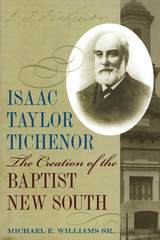
The influential role Tichenor played in shaping both the Baptist denomination and southern culture
Isaac Taylor Tichenor worked as a Confederate chaplain, a mining executive, and as president of the Agricultural and Mechanical College of Alabama (now Auburn University). He also served as corresponding secretary for the Home Mission Board of the Southern Baptist Convention in Atlanta from 1882 until 1899. In these capacities Tichenor developed the New South ideas that were incorporated into every aspect of his work and ultimately influenced many areas of southern life, including business, education, religion, and culture.
In Isaac Taylor Tichenor: The Creation of the Baptist New South, Michael E. Williams Sr. provides a comprehensive analysis of Tichenor’s life, examining the overall impact of his life and work. This volume also documents the methodologies Tichenor used to rally Southern Baptist support around its struggling Home Mission Board, which defined the makeup of the Southern Baptist Convention and defended the territory of the convention.
Tichenor was highly influential in forming a uniquely southern mindset prior to and at the turn of the century. Williams contends that Tichenor’s role in shaping Southern Baptists as they became the largest denomination in the South was crucial in determining their identity both the identities of the region and the SBC.
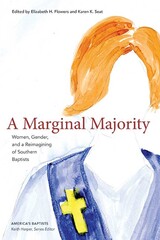
In step with the #MeToo movement and third wave feminism, women’s roles provoke lively debate in today’s evangelical sphere. The Southern Baptist Convention (SBC) has a complicated past regarding this issue, and determining what exactly women’s roles in home, church, and society should be, or even what these roles should be called, has been a contentious subject. In A Marginal Majority: Women, Gender, and a Reimagining of Southern Baptists, editors Elizabeth H. Flowers and Karen K. Seat and eight other contributors examine the SBC’s complex history regarding women and how that history reshapes our understanding of the denomination and its contemporary debates.
This comprehensive volume starts with women as SBC fundraisers, moves to the ways they served Southern Baptist missions, and considers their struggles to find a place at Southern Baptist seminaries as well as their launching of “teaching” or “women’s” ministries. Along the way, it introduces new personalities, offers fresh considerations of familiar figures, and examines the power dynamics of race and class in a denomination that dominated the South and grew into a national behemoth.
Additionally, the essay collection provides insights into why the SBC has often politically aligned with the right. Not only did the denomination become increasingly oriented toward authoritarianism as it clamped down on evangelical feminism, but, as several contributors reveal, even as Southern Baptist women sought agency, they often took it from others. Read together, the chapters strike a somber tone, challenging any triumphal historiography of the past.
By providing a history of contentious issues from the nineteenth century to the present day, A Marginal Majority provides invaluable context for the recurrent struggles women have faced within the United States’ largest Protestant denomination. Moreover, it points to new directions in the study of American denominational life and culture.
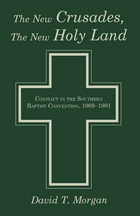
Examines the conflict between modern-day Southern Baptists and “liberal” Southern Baptists over control of the Southern Baptist Convention
David Morgan captures the essence of the conflict between some modern-day Southern Baptists, who saw themselves as crusaders for truth, as they sought to redeem a new holy land--the Southern Baptist Convention-- from the control of other Southern Baptists they viewed as "liberals." To the so-called liberals, the crusaders were "fundamentalists" on a mission, not to reclaim the SBC in the name of theological truth but to gain control and redirect its activities according to their narrow political, social, and theological perspectives. The New Crusades provides a comprehensive history of the conflict, taking the reader through the bitter and divisive struggles of the late 1980s, that culminated in the 1991 emergence of a moderate faction within the SBC. The fundamentalists had won.
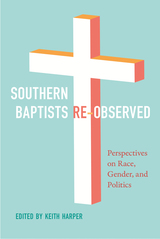
The sweeping success of the conservative takeover—based on enforcing doctrinal fidelity, especially on issues like biblical inerrancy and so-called complementarianism, a rejection of modern, secular values, and advanced international missionary work—veiled a weakness at its very heart. By the turn of the twenty-first century, the conservative resurgence failed to attract new members and, even worse, the younger generation who had grown up in the SBC were fleeing the denomination—nearly half of them are leaving the church as adults and never coming back. The contributors to this volume all offer insights into the question of why. While conservatives dominate the SBC’s governance, they have failed to resolve issues that preoccupy its members and the larger society, including those related to gender, homosexuality, race, and abuse.
The essays are grouped under four broad categories: Truth and Freedom: Baptist Institutions and Contentious Issues; Defining and Defending Biblical Truth: Staking the Boundaries; Apologies, Reconciliation, and Continuing Reality; and the View from Outside. With an introduction by editor Keith Harper contextualizing the history of the movement and the issues it faces today, this collection is sure to add new insight into this influential denomination.
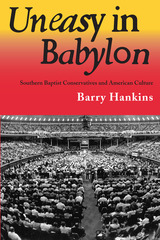
The definitive account of how conservative Southern Baptists came to dominate the nation's largest Protestant denomination
In 1979 a group of conservative members of the Southern Baptists Convention (SBC) initiated a campaign to reshape the denomination’s seminaries and organizations by installing new conservative leaders who made belief in the inerrancy of the Bible a condition of service. They succeeded. This book is a definitive account of that takeover.
Barry Hankins argues that the conservatives sought control of the SBC not or not only to secure the denomination's orthodoxy but to mobilize Southern Baptists for a war against secular culture. The best explanation of the beliefs and behavior of Southern Baptist conservatives, Hankins concludes, lies in their adoption of the culture war model of American society. Believing that "American culture has turned hostile to traditional forms of faith,” they sought to deploy the Southern Baptist Convention in a "full-scale culture war" against secularism in the United States. Hankins traces the roots of this movement to the ideas of such post-WWII northern evangelicals as Carl F. H. Henry and Francis Schaeffer. Henry and Schaeffer viewed America's secular culture as hostile to Christianity and called on evangelicals to develop a robust Christian opposition to secular culture. As the nation’s largest Protestant denomination, SBC positions on divisive cultural issues like abortion have remade the American political landscape, most notably in the reversal of Roe v. Wade.
Hankins also argues, however, that Southern Baptist conservatives sought more than orthodox adherence to Biblical inerrancy. They also sought an identity that was authentically Baptist and Southern. Hankin’s excellent and prescient work will fascinate readers interested in contemporary American religion, culture, and public policy, as well as in the American South.
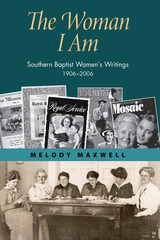
The Southern Baptist Convention (SBC) represents the largest Protestant denomination in the United States, yet Southern Baptist women’s voices have been underreported in studies of American religion and culture. In The Woman I Am, Melody Maxwell explores how female Southern Baptist writers and editors in the twentieth century depicted changing roles for women and responded to the tensions that arose as Southern Baptist women assumed leadership positions, especially in the areas of missions and denominational support.
Given access to a century of primary sources and archival documents, Maxwell writes, as did many of her subjects, in a style that deftly combines the dispassionate eye of an observer with the multidimensional grasp of a participant. She examines magazines published by Woman’s Missionary Union (WMU), an auxiliary to the SBC: Our Mission Fields (1906–1914), Royal Service (1914–1995), Contempo (1970–1995), and Missions Mosaic (1995–2006). In them, she traces how WMU writers and editors perceived, constructed, and expanded the lives of southern women.
Showing ingenuity and resiliency, these writers and editors continually, though not always consciously, reshaped their ideal of Christian womanhood to better fit the new paths open to women in American culture and Southern Baptist life. Maxwell’s work demonstrates that Southern Baptists have transformed their views on biblically sanctioned roles for women over a relatively short historical period.
How Southern Baptist women perceive women’s roles in their churches, homes, and the wider world is of central importance to readers interested in religion, society, and gender in the United States. The Woman I Am is a tour de force that makes a lasting contribution to the world’s understanding of Southern Baptists and to their understanding of themselves.
READERS
Browse our collection.
PUBLISHERS
See BiblioVault's publisher services.
STUDENT SERVICES
Files for college accessibility offices.
UChicago Accessibility Resources
home | accessibility | search | about | contact us
BiblioVault ® 2001 - 2024
The University of Chicago Press









